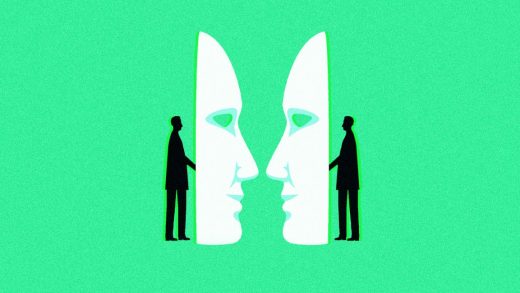Do this one thing to help feel better about yourself if you’ve got impostor syndrome
It was an upstart computer-recycling outfit. People and organizations donated old computers, a team of volunteers fixed them, and the repaired computers were either sold or donated to other nonprofits.
At least, that was the idea.
The organization was pretty dysfunctional until a guy calling himself “Brazil” showed up. He worked tirelessly to make everything come together. He was on the phone constantly, convinced several organizations to donate old equipment, and coordinated a steady stream of volunteers. Computers were being sold, regularly—more than enough to pay for rent. The organization, after months of inertia, was starting to find its feet.
Then Brazil emptied the organization’s entire bank account into his own before skipping town. The nonprofit shut down not long after that.
This person was a con artist—an actual impostor. And you know what? I don’t think he doubted himself once. He projected so much confidence in all of his statements, even ones that were objectively false, that you couldn’t help but believe him. I honestly don’t think he’s doubted himself in his entire life.
Because actual impostors don’t experience impostor syndrome. They don’t wonder if they’re qualified for their current position, or if they measure up to their peers. They just lie, lie, lie, until they have access to what they want, then they take it—and leave.
Brilliant people tend to doubt themselves
Impostor syndrome is a common psychological pattern where people doubt their own knowledge and skills, then live in fear that they’ll eventually be outed as a fraud. This is particularly common among highly qualified and experienced people.
That sounds odd—why would qualified people doubt themselves? Remember: Highly qualified people tend to work around other highly qualified people and also tend to measure their own self-worth in comparison to others. That’s a recipe for self-doubt.
Zapier, where I work, is a company with a staggeringly high percentage of brilliant people, which can be very intimidating. Most everyone is very friendly and will help you if you have any questions, but it’s still very easy to look around and feel like you don’t measure up.
Some of the smartest people I’ve ever met—people who consistently do great work, and in some cases manage entire departments—question whether they know anything about fields they’ve worked in for over a decade. And they shouldn’t feel that way. None of these people are pulling one over on the company—they’re all qualified to do what they do and are making contributions no one else could. They’re doing good work.
It’s a hard feeling to get over, but every time I feel it, I think about Brazil. He could confidently state something that’s objectively not true and would double down if you questioned him about it. I know because this happened to me. I doubted things I knew to be true because he was that confident and that persuasive. I’ll never know what was going on inside his head, but I don’t think he spent a moment questioning himself.
If you’re not actually a con artist, and you’re experiencing impostor syndrome, you should find comfort in this. The fact that you’re wondering whether you’re a fraud probably means that you’re not one. Actual impostors don’t ask themselves if they’re a fraud.
A monkey with a typewriter
My Zapier colleague Hannah asked me to write an article about how amazing she is. It was a joke, but I’m going to go ahead and actually do it.
Hannah is one of my favorite people to talk to on earth and is also really good at what she does. I learn something from her every week and deeply respect her abilities. So when she recently wrote an article titled “How to write real good,” I doubted myself. The article encouraged would-be writers to learn grammar, understand the rules of language, consult a style guide, and learn how to diagram sentences.
I’m a writer. I have never done any of these things.
It made me think I don’t actually know how to write—that’s what impostor syndrome does to your brain. Never mind that I’ve been writing professionally since 2007. Never mind that I’ve had a lot of success in that time. If someone I respect thinks this is how you learn to write, and I haven’t done that, my mind is going to think that I simply don’t know how to write.
But that’s not true. I just learned a different way.
This has happened to me in other contexts too. I paid for a good chunk of college by working at a rural Ontario nursery, taking care of plants every summer from grade nine until my last year of college. I got pretty good at pruning, quickly shaping wholesale plants so that they would grow into something retail outlets could display. I don’t remember anyone telling me how to do it—I just remember watching, mimicking, and eventually being able to shape a dogwood, a cedar, or a Japanese maple just so.
My wife once asked me to explain how to prune a bush while we were working in our yard. I couldn’t. It’s not something I’ve ever thought about or have a grand theory for—it’s just something I know how to do.
Pruning plants and writing—they’re instincts. They’re skills I have because I’ve done them a lot. I can’t point to any teachers who showed me how, and I couldn’t explain the mechanics of it if I tried. I have no idea what a predicate is, for example. (I just now looked up what a predicate is, and I’m going to be honest: I still have no idea what a predicate is.)
Sometimes I feel bad about this; like I’m stupid, a monkey who learned a trick through repetition.
But I’m not an impostor—I’m actually good at this. I know this, if only because you’re still reading this article, and it’s not easy to keep someone reading this long.
It’s not useful for me to read Hannah’s advice on becoming a better writer and conclude that I must not be a good writer. People learn in different ways, is all. And I shouldn’t listen to that voice that tells me I’m faking it, because I’m not faking it. I’m not a con artist. An actual con artist wouldn’t read an article like Hannah’s and doubt themselves. They’d read the article and then claim to have already known all of those things and already be great at them.
So I’m glad that voice of self-doubt is there because without it, I’d assume I already know everything, and I’d never bother to improve. Who knows? Maybe someday I’ll learn what a predicate is.
Out yourself and you’ll feel better
I’m lucky: I work at a company that has normalized talking about impostor syndrome. There’s a dedicated Slack channel for the issue where 100 or so people support each other. There are various educational resources available specifically for this issue, and I have several friends here who have talked me through it. I can’t tell you how comforting this is.
One thing a con artist will never do is openly admit that they’re conning you. They will deny, lie, and generally talk in circles around the truth. So if you want to know 100% that you’re not an impostor, do something no impostor would ever do: Out yourself. Tell a coworker you trust how you feel. I bet they’ll react with understanding and that you’ll feel a lot better afterward.
This article originally appeared on Zapier’s blog and is reprinted with permission.
(35)



